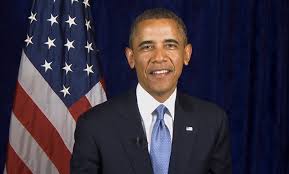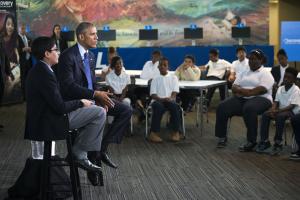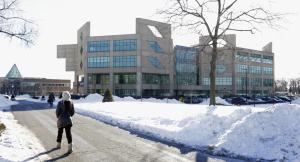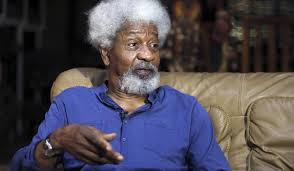In quick order, Obama decided to locate his presidential library in his Chicago hometown and on Monday he will announce the launch of a foundation to continue the work of a program he created to broaden educational and other opportunities for boys and young men of color.
“I’ll be done being president in a couple of years, and I’ll still be a pretty young man, not compared to you guys, but I’ll still be pretty young,” Obama told a group of middle-school students recently. “And so I’ll go back to doing the kinds of work that I was doing before, just trying to find ways to help people, help young people get educations, and help people get jobs, and try to bring businesses into neighborhoods that don’t have enough businesses. That’s the kind of work that I really love to do.”
Obama has seemed more focused than ever on legacy-building achievements since last fall, when the outcome of significant Democratic losses in the Senate put Republicans in control of both houses of Congress for the first time since he took office in 2009.
Shortly after the election rout, Obama announced controversial new steps to shield millions of people living in the country illegally from the threat of deportation, but his actions are being challenged in federal court.
He also announced a historic thaw in relations with Cuba, long isolated by the United States, and is leading other world powers in pursuit of a deal to prevent Iran from developing nuclear weapons.
Obama would also count the 2010 health care law as a legacy item, provided that it is upheld when the Supreme Court rules by the end of June on another challenge to one of its key components. The law has survived multiple attempts by congressional Republicans to overturn all or just parts of it. Obama’s legacy also will be shaped by failures and setbacks in domestic and foreign policy and the rancorous political partisanship he promised to heal but did not.
On Monday, Obama will head to New York City to speak at the launch of the My Brother’s Keeper Alliance, a nonprofit organization that is being established to continue the work of the My Brother’s Keeper initiative started by the president.
Under the year-old initiative, businesses, foundations and community groups coordinate spending on education and other programs to help minority males stay on the right track.
“This is an issue that the president intends to continue to be focused on long after he’s left the Oval Office,” spokesman Josh Earnest said, in part because of recent high-profile deaths of black men during encounters with police in Missouri, Ohio, New York City, South Carolina and Baltimore.
Besides the thought of possibly resuming his work as a community organizer, Obama also has spoken of a desire for a post-presidential return to the classroom. He once taught constitutional law at the University of Chicago.
Justin Vaughn, who teaches political science at Boise State University in Idaho, said the issues presidents choose to work on out of office often stem from personal values or events that happened during the administration. Vaughn pointed to Obama’s intent to stay involved with the My Brother’s Keeper program and said that for a president who operated safely and cautiously while in office “maybe it’s a hint that he would be more likely to wade into the issues that animated him as a young man.”
Obama joked about his legacy and the health care law at a Washington black-tie dinner last week.
“The fact is, though, at this point, my legacy is finally beginning to take shape. The economy is getting better. Nine in 10 Americans now have health coverage,” he said. “Today, thanks to Obamacare, you no longer have to worry about losing your insurance if you lose your job. You’re welcome, Senate Democrats.”




 Piece by piece, President Barack Obama is trying to build the foundation for the legacy he wants to leave, putting in place decisions that will reverberate beyond his presidency.
Piece by piece, President Barack Obama is trying to build the foundation for the legacy he wants to leave, putting in place decisions that will reverberate beyond his presidency.










